-
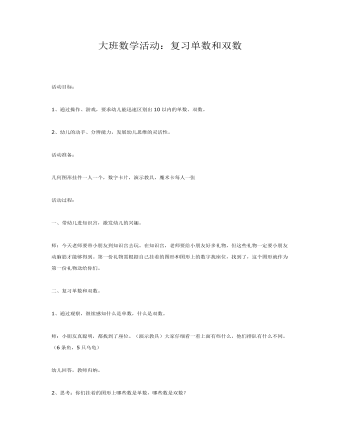
大班数学活动:复习单数和双数课件教案
2、幼儿的动手、分辨能力,发展幼儿思维的灵活性。活动准备:几何图形挂件一人一个,数字卡片,演示教具,魔术卡每人一张活动过程:一、带幼儿进知识宫,激发幼儿的兴趣。师:今天老师要带小朋友到知识宫去玩。在知识宫,老师要给小朋友好多礼物,但这些礼物一定要小朋友动脑筋才能够得到。第一份礼物需根据自己挂着的图形和图形上的数字找座位,找到了,这个图形就作为第一份礼物送给你们。
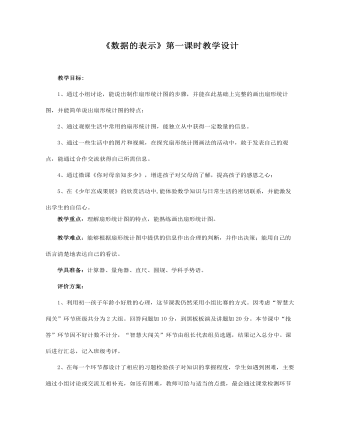
数据的收集与整理 3 数据的表示教案教学设计
创设情境,导入新课:你对母亲知多少师问1:我们5月份刚过了一个重要的节日,你知道是什么吗?----母亲节。师问2:那你知道妈妈的生日吗?(举手示意),每个妈妈都知道自己孩子的生日,请不知道的同学回家了解一下,多关心一下自己的父母。师问3:那你知道妈妈最爱吃的菜吗?你可以选择知道、不知道或者是没有爱吃的(拖动白板上相对应的表情符号)。请大家用不同的手势表示出来。我找3名同学统计各组的数据,写在黑板上(随机找3名学生数人数)。下面我来随机采访一下:你妈妈最喜欢吃的菜是什么?(教师随机采访,结合营养搭配和感恩教育)

中班主题课件教案:“我的朋友”的主题反思
主题目标: 能关注周围环境中的事物,初步了解并体验人与人、人与整个环境和谐相处的快乐感觉;能在成人帮助下逐步形成与他人共处的良好态度;学习并尝试与人交往的方式,促进社会交往能力的发展。 主题的开展: 本月以“我的朋友”为主题,围绕“朋友都有谁、快快乐乐来玩耍、友好相处是朋友、”三个方面的内容展开活动,环境方面突出的是我们有效的利用家长资源,带动幼儿及教师家长的兴趣。 俗话说:“有朋自远方来”孩子年龄随小,但他们也在逐渐与社会接轨,心中都有自己的好朋友,比如有的幼儿说“我爸爸是我的好朋友”“我班xxx 是我的好朋友” “xx班的xxx是我的好朋友”,为此我们组织幼儿完成好朋友画像的活动。目的是通过幼儿讲述,不仅提高幼儿口语表达能力。而且进一步增进好朋友之间的情感。
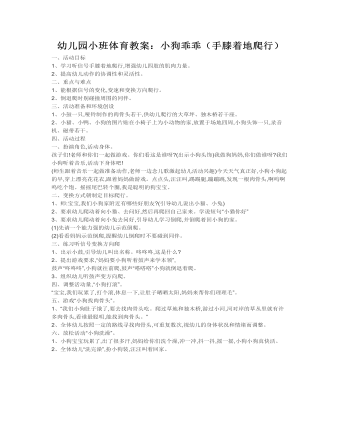
幼儿园小班体育教案:小狗乖乖(手膝着地爬行)
二、重点与难点 1、能根据信号的变化,变速和变换方向爬行。 2、倒退爬时别碰撞周围的同伴。 三、活动准备和环境创设 1、小鼓一只,哑铃制作的肉骨头若干,供幼儿爬行的大草坪、独木桥若干座。 2、小猫、小鸭、小狗的图片贴在小椅子上为小动物的家,放置于场地四周,小狗头饰一只,录音机、磁带若干。 四、活动过程 一、扮演角色,活动身体。 孩子们!老师和你们一起做游戏。你们看这是谁呀?(出示小狗头饰)我做狗妈妈,你们做谁呀?我们小狗听着音乐,活动下身体吧! (师生跟着音乐一起做准备动作,老师一边念儿歌激起幼儿活动兴趣)今天天气真正好,小狗小狗起的早,穿上漂亮花花衣,跟着妈妈做游戏。点点头,汪汪叫,踢踢腿,蹦蹦跳,发现一根肉骨头,啊呜啊呜吃个饱。摇摇尾巴转个圈,我是聪明的狗宝宝。
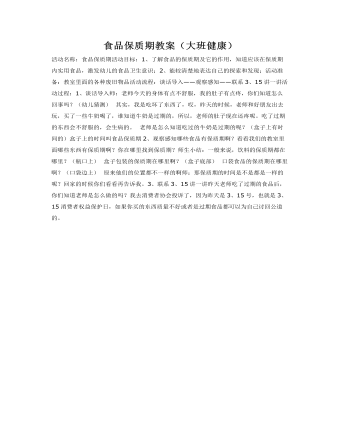
食品保质期教案(大班健康)
1、了解食品的保质期及它的作用,知道应该在保质期内实用食品,激发幼儿的食品卫生意识;2、能较清楚地表达自己的探索和发现;活动准备:教室里面的各种废旧物品活动流程:谈话导入——观察感知——联系3、15讲一讲活动过程:1、谈话导入师:老师今天的身体有点不舒服,我的肚子有点疼,你们知道怎么回事吗?(幼儿猜测) 其实,我是吃坏了东西了,哎,昨天的时候,老师和好朋友出去玩,买了一些牛奶喝了,谁知道牛奶是过期的,所以,老师的肚子现在还疼呢。吃了过期的东西会不舒服的,会生病的。 老师是怎么知道吃过的牛奶是过期的呢?(盒子上有时间的)盒子上的时间叫食品保质期
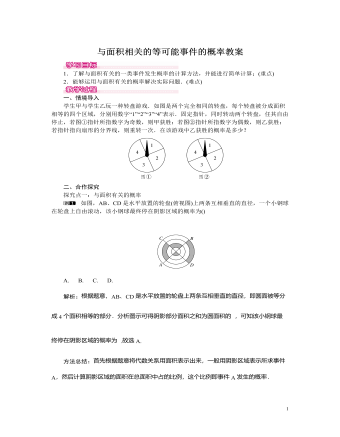
北师大初中七年级数学下册与面积相关的等可能事件的概率教案
方法总结:当某一事件A发生的可能性大小与相关图形的面积大小有关时,概率的计算方法是事件A所有可能结果所组成的图形的面积与所有可能结果组成的总图形面积之比,即P(A)=事件A所占图形面积总图形面积.概率的求法关键是要找准两点:(1)全部情况的总数;(2)符合条件的情况数目.二者的比值就是其发生的概率.探究点二:与面积有关的概率的应用如图,把一个圆形转盘按1∶2∶3∶4的比例分成A、B、C、D四个扇形区域,自由转动转盘,停止后指针落在B区域的概率为________.解析:∵一个圆形转盘按1∶2∶3∶4的比例分成A、B、C、D四个扇形区域,∴圆形转盘被等分成10份,其中B区域占2份,∴P(落在B区域)=210=15.故答案为15.三、板书设计1.与面积有关的等可能事件的概率P(A)= 2.与面积有关的概率的应用本课时所学习的内容多与实际相结合,因此教学过程中要引导学生展开丰富的联想,在日常生活中发现问题,并进行合理的整合归纳,选择适宜的数学方法来解决问题
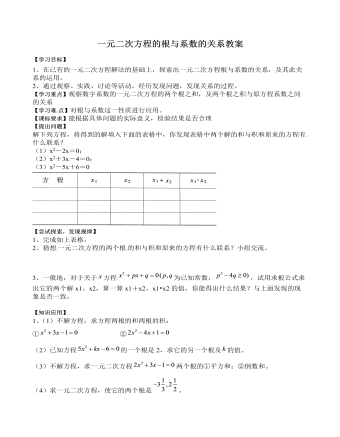
北师大初中数学九年级上册一元二次方程的根与系数的关系2教案
3、一般地,对于关于 方程 为已知常数, ,试用求根公式求出它的两个解x1、x2,算一算x1+x2、x1?x2的值,你能得出什么结果?与上面发现的现象是否一致。【知识应用】 1、(1)不解方程,求方程两根的和两根的积:① ② (2)已知方程 的一个根是2,求它的另一个根及 的值。(3)不解方程,求一 元二次方程 两个根的①平方和;②倒数和。(4)求一元二次方程,使它的两个根是 。【归纳小结】【作业】1、已知方程 的一个根是1,求它的另一个根及 的值。2、设 是方程 的两个根,不解方程,求下列各式的值。① ;② 3、求一个一元次方程,使它的两 个根分别为:① ;② 4、下列方程两根的和与两根的积各是多少 ?① ; ② ; ③ ; ④ ;
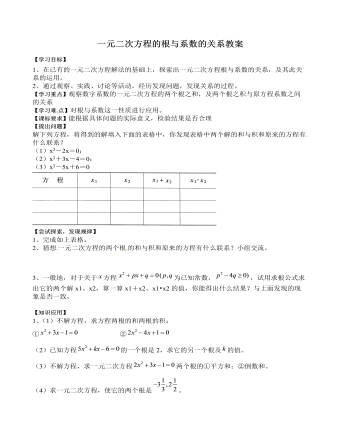
北师大初中数学九年级上册一元二次方程的根与系数的关系2教案
2、猜想 一元二次方程的两个根 的和与积和原来的方程有什么联系?小组交流。3、一般地,对于关于 方程 为已知常数, ,试用求根公式求出它的两个解x1、x2,算一算x1+x2、x1?x2的值,你能得出什么结果?与上面发现的现象是否一致。【知识应用】 1、(1)不解方程,求方程两根的和两根的积:① ② (2)已知方程 的一个根是2,求它的另一个根及 的值。(3)不解方程,求一 元二次方程 两个根的①平方和;②倒数和。(4)求一元二次方程,使它的两个根是 。【归纳小结】【作业】1、已知方程 的一个根是1,求它的另一个根及 的值。2、设 是方程 的两个根,不解方程,求下列各式的值。① ;② 3、求一个一元次方程,使它的两 个根分别为:① ;② 4、下列方程两根的和与两根的积各是多少 ?① ; ② ; ③ ; ④ ;
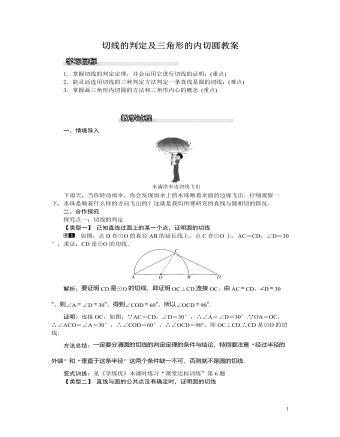
北师大初中九年级数学下册切线的判定及三角形的内切圆教案
解析:(1)连接BI,根据I是△ABC的内心,得出∠1=∠2,∠3=∠4,再根据∠BIE=∠1+∠3,∠IBE=∠5+∠4,而∠5=∠1=∠2,得出∠BIE=∠IBE,即可证出IE=BE;(2)由三角形的内心,得到角平分线,根据等腰三角形的性质得到边相等,由等量代换得到四条边都相等,推出四边形是菱形.解:(1)BE=IE.理由如下:如图①,连接BI,∵I是△ABC的内心,∴∠1=∠2,∠3=∠4.∵∠BIE=∠1+∠3,∠IBE=∠5+∠4,而∠5=∠1=∠2,∴∠BIE=∠IBE,∴BE=IE;(2)四边形BECI是菱形.证明如下:∵∠BED=∠CED=60°,∴∠ABC=∠ACB=60°,∴BE=CE.∵I是△ABC的内心,∴∠4=12∠ABC=30°,∠ICD=12∠ACB=30°,∴∠4=∠ICD,∴BI=IC.由(1)证得IE=BE,∴BE=CE=BI=IC,∴四边形BECI是菱形.方法总结:解决本题要掌握三角形的内心的性质,以及圆周角定理.
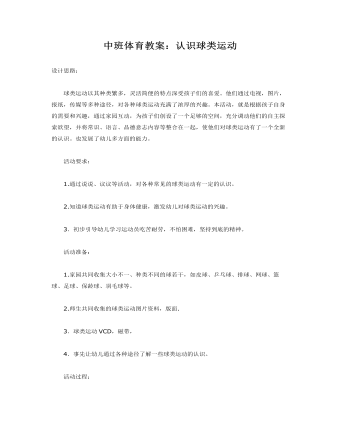
中班体育教案:认识球类运动
活动要求:1.通过说说、议议等活动,对各种常见的球类运动有一定的认识。2.知道球类运动有助于身体健康,激发幼儿对球类运动的兴趣。3.初步引导幼儿学习运动员吃苦耐劳,不怕困难,坚持到底的精神。 活动准备:1.家园共同收集大小不一、种类不同的球若干,如皮球、乒乓球、排球、网球、篮球、足球、保龄球、羽毛球等。
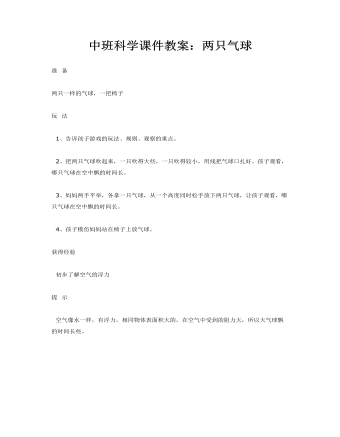
中班科学课件教案:两只气球
玩 法 1、告诉孩子游戏的玩法、规则、观察的重点。 2、把两只气球吹起来,一只吹得大些,一只吹得较小,用线把气球口扎好。孩子观看,哪只气球在空中飘的时间长。
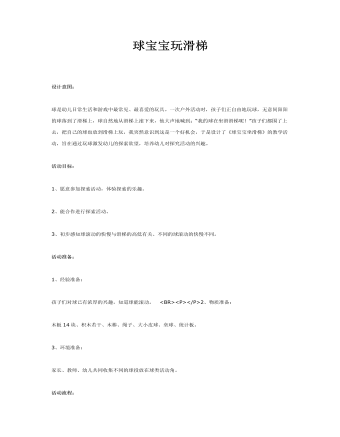
中班科学课件教案:球宝宝玩滑梯
活动目标:1、愿意参加探索活动,体验探索的乐趣。2、能合作进行探索活动。3、初步感知球滚动的快慢与滑梯的高低有关、不同的球滚动的快慢不同。活动准备:1、经验准备:孩子们对球已有浓厚的兴趣,知道球能滚动。 <BR><P></P>2、物质准备:木板14块、积木若干、木棒、绳子、大小皮球、垒球、统计板。3、环境准备:家长、教师、幼儿共同收集不同的球投放在球类活动角。
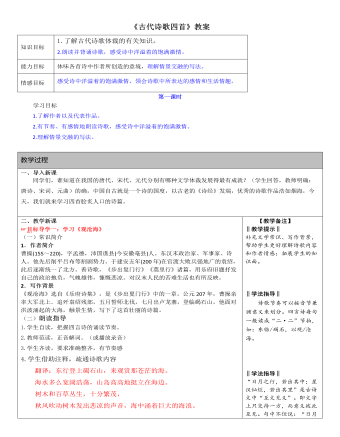
部编版语文七年级上册《古代诗歌四首》教案
(一)常识简介1.作者简介王湾,唐代诗人。生卒年、字号均不详。洛阳(今属河南)人。2.写作背景次北固山下,意思是泊舟停宿于北固山下。作者家住洛阳,旅于江南,在这座山下停泊,被这里开阔秀丽的景色所吸引,写下了这首诗。3.文章体裁《次北固山下》是五言律诗。律诗共八句,一二两句为首联,三四两句为颔联,五六两句为颈联,七八两句为尾联;每句有五个字,叫五言。(二)朗读指导1.学生听读,把握五言诗的诵读节奏。2.教师正音解词,学生自读。(可以播放课文朗读的视频或音频文件。)3.理解大意翻译:旅途在青山外,在碧绿的江水前行舟。潮水涨满,两岸之间水面宽阔,顺风行船恰好把帆儿高悬。夜幕还没有褪尽,旭日已在江上冉冉升起,还在旧年时分,江南已有了春天的气息。寄出去的家信不知何时才能到达,希望北归的大雁捎到洛阳去。
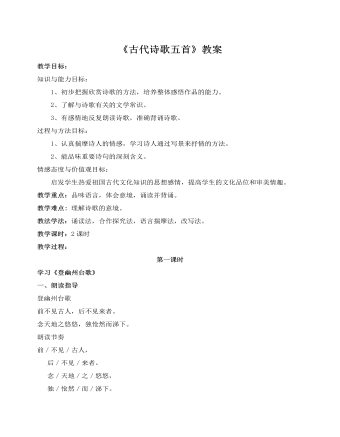
部编版语文七年级下册《古代诗歌五首》教案
四、赏析诗歌这首诗,是古今一致公认的名篇。诗人登上幽州的蓟北楼远望,悲从中来,并以“山河依旧,人物不同”来抒发自己“生不逢辰”的哀叹。“前不见古人”一句五个字,但却包括了燕昭王在内的许多古代贤王,他们知人善任,人尽其才,大约怎么也不会任用像武攸宜这样的无能之人;至于作者自己,如有像燕昭王这样的统治者,才能一定会得到施展,抱负终会实现。但这一切不过是感慨而已,因为前代的贤王已成过去,是见不着的。 “后不见来者”,后代的贤君也将会有的,但人的生命是如此短暂,自己又怎么能见得着呢!前代的贤王见不着,后代的贤君等不到,空有治国安民的理想,终一生不得实现,这该是多么令人忧郁的事情啊! 1、孤独2、生之短促 人类摆脱不了的命运 3、怀才不遇 封建士子共同的命运天 地 人——孤独诗歌表现了诗人怎么样的情怀?
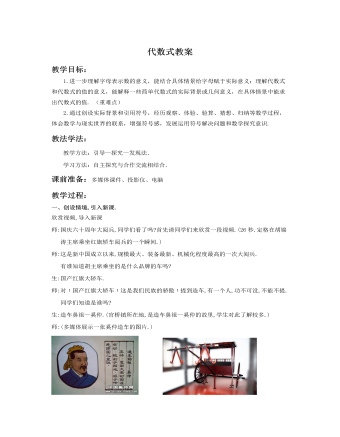
北师大初中七年级数学上册代数式教案2
1.进一步理解字母表示数的意义,能结合具体情景给字母赋于实际意义;理解代数式和代数式的值的意义,能解释一些简单代数式的实际背景或几何意义,在具体情景中能求出代数式的值. (重难点)2.通过创设实际背景和引用符号,经历观察、体验、验算、猜想、归纳等数学过程,体会数学与现实世界的联系,增强符号感,发展运用符号解决问题和数学探究意识. 教法学法:教学方法:引导—探究—发现法.学习方法:自主探究与合作交流相结合.课前准备:多媒体课件、投影仪、电脑教学过程:一、创设情境,引入新课.欣赏视频,导入新课师:国庆六十周年大阅兵,同学们看了吗?首先请同学们来欣赏一段视频.(26秒.定格在胡锦涛主席乘坐红旗轿车阅兵的一个瞬间.)师:这是新中国成立以来,规模最大、装备最新、机械化程度最高的一次大阅兵.
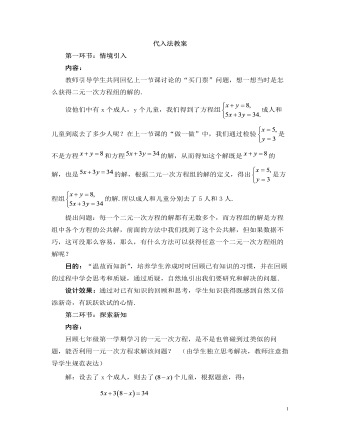
北师大初中数学八年级上册代入法2教案
第五环节:课堂小结内容:师生相互交流总结解二元一次方程组的基本思路是“消元”,即把“二元”变为“一元”; 解二元一次方程组的第一种解法——代入消元法,其主要步骤是:将其中的一个方程中的某个未知数用含有另一个未知数的代数式表示出来,并代入另一个方程中,从而消去一个未知数,化二元一次方程组为一元一次方程.解这个一元一次方程,便可得到一个未知数的值,再将所求未知数的值代入变形后的方程,便求出了一对未知数的值.即求得了方程组的解.目的:鼓励学生通过本节课的学习,谈谈自己的收获与感受,加深对 “温故而知新” 的体会,知道“学而时习之”.设计效果:学生能够在课堂上畅所欲言,并通过自己的归纳总结,进一步巩固了所学知识.第六环节:布置作业课本习题5.2教学设计反思1.引入自然.二元一次方程组的解法是学习二元一次方程组的重要内容.教材通过上一小节的实际问题,比较一元一次方程的列法和解法,从而自然引入二元一次方程组的代入消元解法.
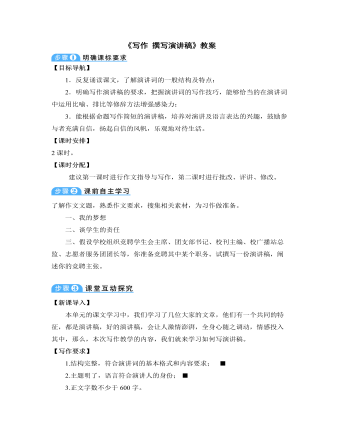
部编版语文八年级下册《写作:撰写演讲稿》教案
3.要语言流畅,不要拖泥带水要把演讲者在头脑里构思的一切都写出来或说出来,让人们看得见,听得到,就必须借助语言这个交流思想的工具。写作演讲稿在语言运用上应注意以下三个问题:(1)口语化。“上口”“入耳”,这是对演讲语言的基本要求,也就是说演讲的语言要口语化。演讲,说出来的是一连串声音,听众听到的也是一连串声音。听众能否听懂,要看演讲者能否说得好,更要看演讲稿是否写得好。如果演讲稿不“上口”,那么演讲的内容再好,也不能使听众“入耳”,完全听懂。写作演讲稿时,应把长句改成短句,把倒装句改成正装句,把单音词换成双音词,把听不明白的文言词语、成语改换或删去。演讲稿写完后,要念一念,听一听,看看是不是“上口”“入耳”。
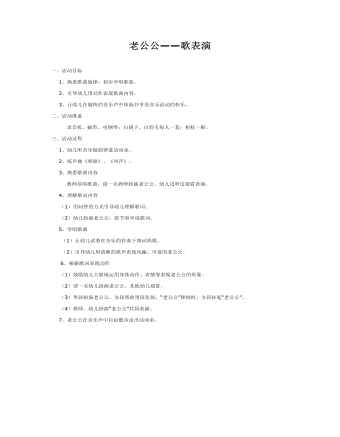
中班音乐教案:老公公—歌表演
二、活动准备 录音机、磁带、电钢琴;白胡子、白眉毛每人一套;拐杖一根。三、活动过程 1、幼儿听音乐做韵律进活动室。 2、练声曲《唱歌》、《叫声》。 3、熟悉歌曲内容 教师范唱歌曲,请一名教师扮演老公公,幼儿边听边观看表演。
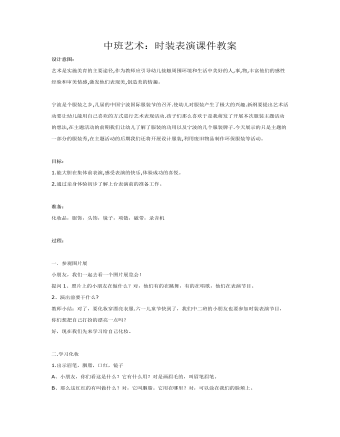
中班艺术:时装表演课件教案
目标:1.能大胆在集体前表演,感受表演的快乐,体验成功的喜悦。2.通过亲身体验初步了解上台表演前的准备工作。 准备:化妆品,服饰,头饰,镜子,项链,磁带,录音机 过程: 一.参观图片展小朋友,我们一起去看一个图片展览会!提问1、照片上的小朋友在做什么?对,他们有的在跳舞,有的在唱歌,他们在表演节目。
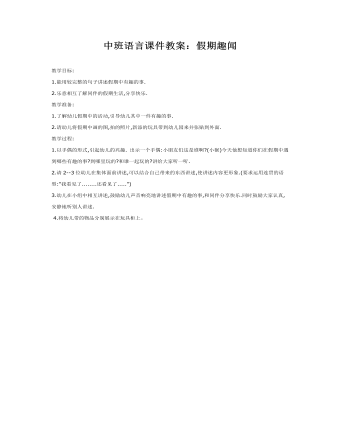
中班语言课件教案:假期趣闻
2.乐意相互了解同伴的假期生活,分享快乐. 教学准备: 1.了解幼儿假期中的活动,引导幼儿其中一件有趣的事. 2.请幼儿将假期中画的图,拍的照片,新添的玩具带到幼儿园来并张贴到外面.

